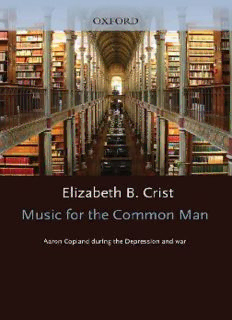
Music for the Common Man: Aaron Copland during the Depression and War PDF
Preview Music for the Common Man: Aaron Copland during the Depression and War
Music for the Common Man This page intentionally left blank Music for the Aaron Copland Common during the Depression Man and War Elizabeth B. Crist 3 3 Oxford University Press, Inc., publishes works that further Oxford University’s objective of excellence in research, scholarship, and education. Oxford New York Auckland Cape Town Dar es Salaam Hong Kong Karachi Kuala Lumpur Madrid Melbourne Mexico City Nairobi New Delhi Shanghai Taipei Toronto With offi ces in Argentina Austria Brazil Chile Czech Republic France Greece Guatemala Hungary Italy Japan Poland Portugal Singapore South Korea Switzerland Th ailand Turkey Ukraine Vietnam Copyright © 2005 by Oxford University Press, Inc. Published by Oxford University Press, Inc. 198 Madison Avenue, New York, New York 10016 www.oup.com First issued as an Oxford University Press Paperback, Oxford is a registered trademark of Oxford University Press All rights reserved. No part of this publication may be reproduced, stored in a retrieval system, or transmitted, in any form or by any means, electronic, mechanical, photocopying, recording, or otherwise, without the prior permission of Oxford University Press. Library of Congress Cataloging-in-Publication Data Crist, Elizabeth Bergman. Music for the common man : Aaron Copland during the depression and war / Elizabeth B. Crist p. cm. Includes bibliographical references. ISBN ---- 1. Copland, Aaron, 1900– 2. Composers—United States— Biography. I. Title. ML410.C756C75 2005 78o'.92—dc22 2004029062 Epigraph source: Carl Sandburg, Th e People, Yes (New York: Harcourt, Brace & World, 1936), 44. Publication of this book was supported by the H. Earle Johnson Fund of the Society for American Music. 9 8 7 6 5 4 3 2 1 Printed in the United States of America on acid-free paper for Harris, always This page intentionally left blank Who shall speak for the people? who has the answers? where is the sure interpreter? who knows what to say? Who can write the music jazz-classical smokestacks-geraniums hyacinths-biscuits now whispering easy now boom doom crashing angular now tough monotonous tom tom Who has enough split-seconds and slow sea-tides? Carl Sandburg, Th e People, Yes (1936) This page intentionally left blank Acknowledgments although it is typical to begin by extending professional thanks before moving on to more personal expressions of gratitude, I fi nd it diffi cult to separate the two, so fortunate am I to have had a host of supportive fac- ulty, institutions, colleagues, and friends. First and foremost, I am grateful to a long list of extraordinary teachers, including Daniel R. Melamed, Robert P. Morgan, and J. Peter Burkholder as well as Rosemary Crawford, Walter Frisch, Cynthia Gessele, Leon Plantinga, Ellen Rosand, Elaine Sisman, and the late Mark Tucker. My work has been funded by the Dena Epstein Award from the Music Library Association, a yearlong fellowship from the National Endowment for the Humanities, and various awards from the School of Music, Graduate School, College of Fine Arts, Vice President for Research, and Vice President and Provost at the University of Texas at Austin. I thank especially Direc- tor B. Glenn Chandler, Associate Dean Doug Dempster, Dean Robert Free- man, and Provost Sheldon Eckland-Olson. Some of these grants enabled me to spend summers working in the Aaron Copland Collection at the Library of Congress, where the librarians, particularly Wilda Heiss and Stephanie Poxon, were unfailingly patient and helpful. At the University of Texas, music librarian David Hunter has been a pleasure to work with, and Dell A. Hol- lingsworth of the Harry Ransom Humanities Research Center has given gen- erously of her time and expertise. For permissions to reproduce Copland’s words and music, I thank James M. Kendrick of the Aaron Copland Fund for Music; Alexis Hart of Brown Raysman Millstein Felder & Steiner LLP; as well as Jennifer Bilfi eld, Caro- lyn Kalett, and Frank Korach of Boosey & Hawkes. Anderson Ferrell kindly granted me access to materials and Jonathan Prude allowed me to quote from sources in the Agnes de Mille Collection at the New York Public Library for the Performing Arts. Passages of this book have previously appeared (in dif- ferent form) in Th e Journal of Th e American Musicological Society 2003, vol.
Description: